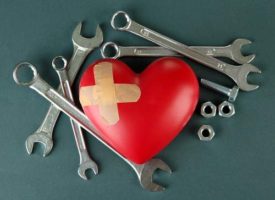The human heart is a pump. Granted, it’s an incredibly complex organ, but its primary purpose, like any pump, is to transfer and deliver fluids.
Many cardiovascular disorders are due to malfunctions in the “pipes,” the arteries and veins that carry the blood pumped by the heart. However, there is one condition that is clearly a pump problem: congestive heart failure (CHF). The heart muscle—damaged by a heart attack, chronic hypertension or coronary artery disease, infection, drugs, or toxins—is unable to pump enough nutrient- and oxygen-rich blood to meet the body’s requirements.
CHF may go unnoticed in its early stages, as the weakened heart compensates by enlarging and thickening so it can beat faster and more strongly. But like any overworked muscle, it can’t keep up indefinitely, and fatigue, shortness of breath, edema (fluid retention), and other symptoms become evident. Conventional physicians prescribe drugs to reduce the heart’s workload, but this doesn’t address the real problem, which is that the heart muscle is simply running out of steam.
What patients also need are therapies to energize the failing heart muscle—therapies that we’ve been using at the Whitaker Wellness Institute for decades.
Reignite Cardiac Energy
Adenosine triphosphate (ATP) is the energy that fuels our cells, and myocardial (heart muscle) cells are voracious consumers of ATP. Therefore, supplying the body with nutrients that engender ATP production should be the first order of business.
To that end, every CHF patient at Whitaker Wellness is prescribed large doses of coenzyme Q10 (CoQ10), L-carnitine, magnesium, and ribose. All these supplements have been independently shown to improve cardiac reserves, exercise tolerance, and ejection fraction (a measure of the heart’s pumping efficiency) in patients with heart failure. But when used in combination, they’re particularly effective.
I had a patient with such severe CHF that he was told he would require a heart transplant. After I treated him with high doses of CoQ10, L-carnitine, and magnesium (ribose wasn’t available back then), he recovered completely. Now, here’s the interesting part. The five-year survival rate of patients with severe CHF is 50 percent, and for people as sick as this guy was, it’s far worse. Well, I first saw this patient more than 20 years ago, and he is still doing well!
Other Nutrients for CHF
We also recommend a broad spectrum of other nutrients. Vitamin D deficiency, for example, was shown in a recent study to be highly prevalent in CHF—and supplemental vitamin D reduced the death rate in these patients.
People with CHF are also often low in a wide range of water-soluble nutrients. One reason is because fluid overload is a characteristic of CHF, and diuretic drugs are often necessary. But while these drugs may be helpful, vitamins and minerals are lost along with excess fluids. In a study of CHF patients conducted last year, researchers linked low levels of vitamin C with elevated C-reactive protein (a marker of inflammation), worsening heart failure, and higher death rates. Beneficial supplements also include selenium, vitamin E, and other antioxidants; folic acid, thiamine, and additional B-complex vitamins; and fish oil.
Can Broken Hearts Be Healed?
Perhaps the most exciting new treatment for CHF is stem cell therapy because it has the potential of replacing damaged cardiac muscle with new tissue. In a recent study published in The Lancet researchers reported the results of a small study involving patients with CHF who were treated with cardiac stem cells, collected from each patient during surgery, purified, and later infused into their damaged hearts. Following treatment, ejection fraction increased by 8 percentage points, and MRIs revealed a 30 percent decrease in dead heart muscle tissue after a year. Study participants also had notable improvements in activity level and quality of life.
At Whitaker Wellness we also offer another therapy that increases levels of circulating stem cells. Enhanced external counterpulsation (EECP) is a noninvasive treatment that dramatically increases blood flow to the heart and throughout the body. Used primarily for angina and coronary artery disease, it is also a proven treatment for CHF.
In a landmark paper published in 2010, researchers cite a study showing that EECP significantly raises levels of circulating endothelial progenitor cells (stem cells from the bone marrow that repair the endothelium, the all-important lining of the arteries) and that this likely helps explain EECP’s enduring benefits. “These cells will find damaged endothelium, ischemic myocardium or apoptotic cells and will proliferate so the benefit extends well beyond the treatment period. The number of circulating stem cells has been correlated with vascular disease, age, and prognosis. Thus increasing these circulating cells seems a reasonable target for therapy.”
Treatment Recommendations
ATP boosters for CHF, taken daily in divided doses, are: coenzyme Q10 200–600 mg, L-carnitine 1,000 mg, magnesium 500–1,000 mg, and ribose 10–15 g. I also recommend taking a high-potency multinutrient, extra vitamin D, and at least 2,000 mg of fish oil daily.
To learn more about receiving stem cell therapy, EECP, and/or the other recommended therapies at Whitaker Wellness, call (866) 611-3720 or click the Contact Us or Complimentary Consultation buttons below.




